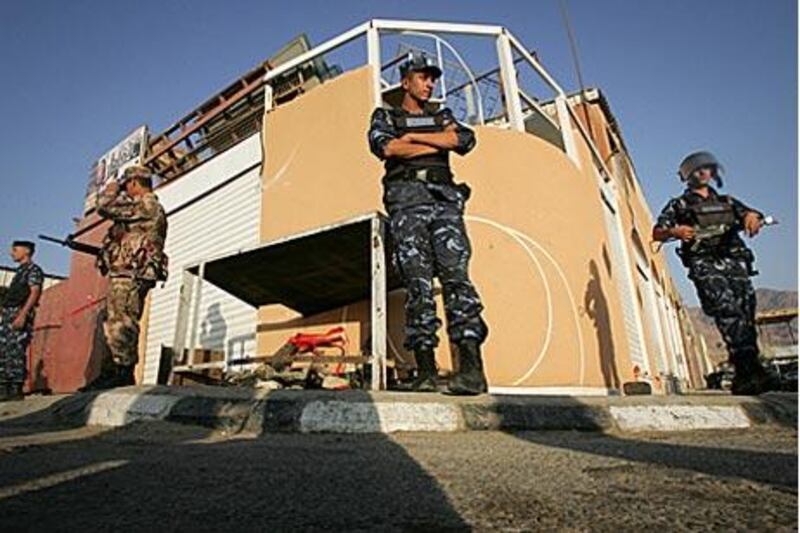AMMAN // Two bungled attacks in the past three months targeting Israelis in Jordan and the southern Israeli city of Eilat have raised speculation that the perpetrators may belong to groups that are not part of a wider militant network.
The first attack, in January, targeted a convoy of Israeli diplomats returning to Israel from Jordan, while the second last month involved two rocket attacks apparently intended to target Eilat, but that landed in Jordanian territory. Neither attack resulted in injuries and no one has claimed responsibility for them. Jordanian authorities have not said whether any progress has been made in either case. But last month Jordan and Egypt denied Israeli media reports that the rockets that landed off the coast of Eilat were launched from their territories.
Jordan's prime minister, Samir Rifai, said he was certain that the rockets were not fired from Jordanian territory. But analysts who specialise in Islamist militancy said there might be Salafi Jihadist groups in Jordan and elsewhere, who are not necessarily affiliated to larger groups such as al Qa'eda but who could be behind the attacks and are looking to make a name for themselves. "These groups are not necessarily linked to al Qa'eda. What they are doing now is disseminating the ideology of al Qa'eda and are trying to launch major attacks in order to impress the mainstream al Qa'eda in Afghanistan in the hope that it would start funding them," said Abdul Hameed Bakier, a terrorism analyst for the Jamestown Foundation, a US-based think tank.
"The same thing happened with Shabab Mujahedeen in Somalia and with Fateh al Islam in Lebanon." Mr Bakier was referring to the Islamist militias in Somalia who publicly announced their allegiance to al Qa'eda this year, and to Fateh al Islam in Lebanon, another al Qa'eda affiliate which in 2007 clashed with security forces in Nahr al Bared, a Palestinian refugee camp in Lebanon. Although al Qa'eda has already been marginalised in places such as Iraq, its ideology persists and is nourished by anti-western and anti-Israeli sentiment.
Marwan Shehadeh, an Amman-based expert on Islamist movements, also believes the recent attacks were the work of small, individual groups and said their size and low profile were possibly the reasons for not claiming responsibility. "There are attempts to establish an Islamic group in the region to target Israeli interests. These small groups have not claimed responsibility over fears that they will get busted and their project will be aborted in its infancy," he said. "Or because they were embarrassed that the operation failed."
Analysts said had the rocket firings been the work of al Qa'eda, the group would have hurried to claim responsibility even though they failed, like in the case of Umar Farouk Abdulmuttalab, the Nigerian student who tried unsuccessfully to blow himself up on board a Northwest Airlines flight as it was preparing to land in Detroit in December. Five years ago, three Katyusha rockets were fired from Aqaba - the southern Jordanian coastal city not far from Eilat - missing two US warships docked in the port there but killing one Jordanian soldier a group linked to al Qa'eda quickly claimed responsibility.
Al Qa'eda's threat to Jordan is widely believed to be in decline since Abu Musab al Zarqawi, a Jordanian militant, was killed in 2006 in Iraq. The country's special intelligence forces, Fursan al Haq, Arabic for the Knights of Justice, provided information to US intelligence that led to the killing of al Zarqawi who had become one of the most notorious figures in the Iraq insurgency. "Al Qa'eda is there but it is no longer major threat to Jordan after the death of Zarqawi, and subsequently Jordan has ridded itself from al Qa'eda's regional threat in Iraq," said Muhammad Abu Rumman, an analyst with Alghad daily newspaper who specialises in extremist Islamist movements.
"Al Qa'eda is also weakened there and it is facing problems inside Iraq." But in the long term, the government's announcement in January this year that it is working with the CIA in Afghanistan could put it in an open confrontation with al Qa'eda, some analysts said, because it has acknowledged that it is an ally in the "war on terror". The announcement came after a Jordanian security agent killed seven CIA agents - his nominal colleagues - in a suicide bombing in Afghanistan.
Salafi Jihadist groups emerged in Jordan in the early 1990s in cities such as Zarqa, Salt and Maan. Most have been inspired by al Qa'eda in Iraq as well as hundreds of Jordanian Mujahideen, who fought with the Afghans against the Soviets in the 1980s. In 2006, Jordan's state security court handed down the death sentence to nine members of a Salafi Jihadist group affiliated to al Qa'eda for plotting chemical attacks in the kingdom in 2004. But their sentence was later commuted to life imprisonment.
For its part, the government has been trying to counter the appeal of radical groups and al Qa'eda ideology by promoting moderate Islam at home and abroad. But Mr Abu Rumman said it would be near impossible to stamp out the threat of terrorism altogether. "There are Salafi groups that have presence in Jordan, and having them under control is difficult because there is the trend of individual Jihadism, just like the recent attempt in Times Square in New York. The trend is dangerous because one person can cause major security threat.
"Also there is a new emerging threat: Hizbollah, Iran and Hamas. There are circles in Jordan which attribute the attack on the Israeli convoy to these groups, particularly because Iran in the past few years started emerging as a regional power. "The attack then was not intended to cause harm but sought to carry a political message to Israel that it is a target that can be reached from anywhere in the region," he said. smaayeh@thenational.ae





